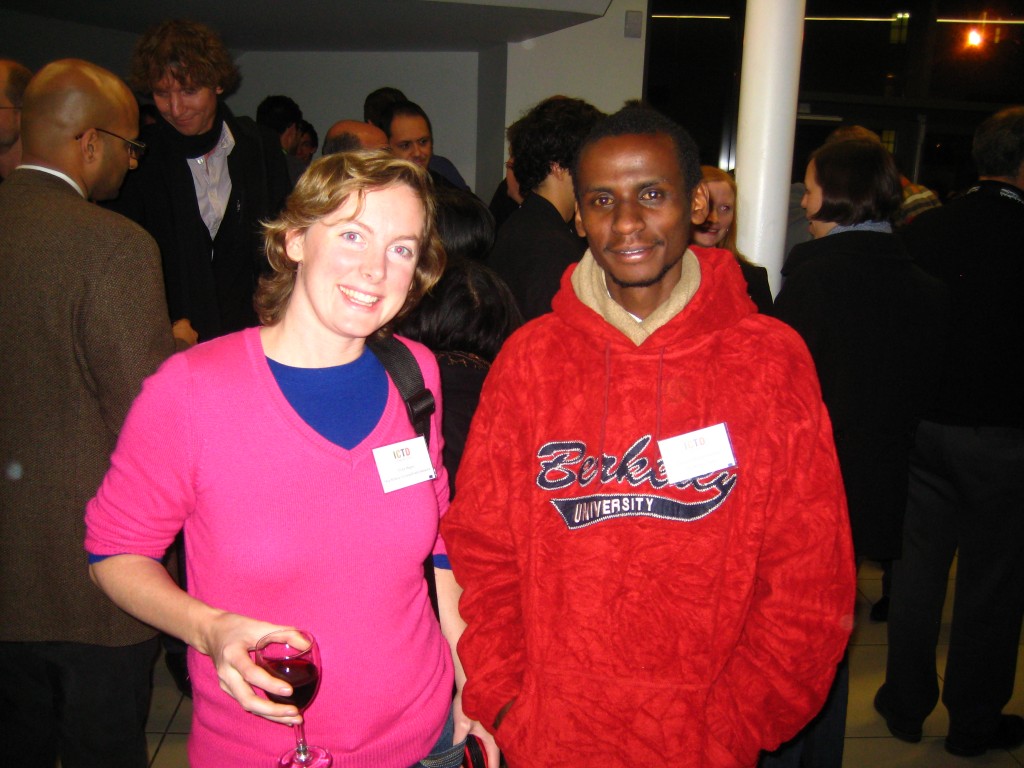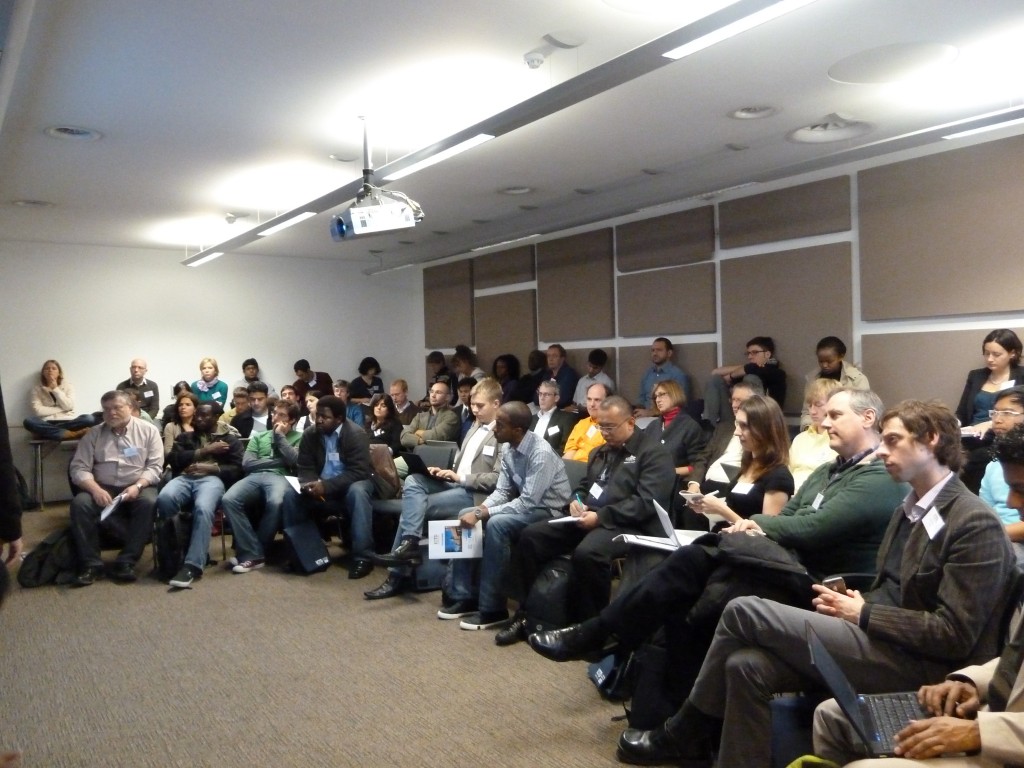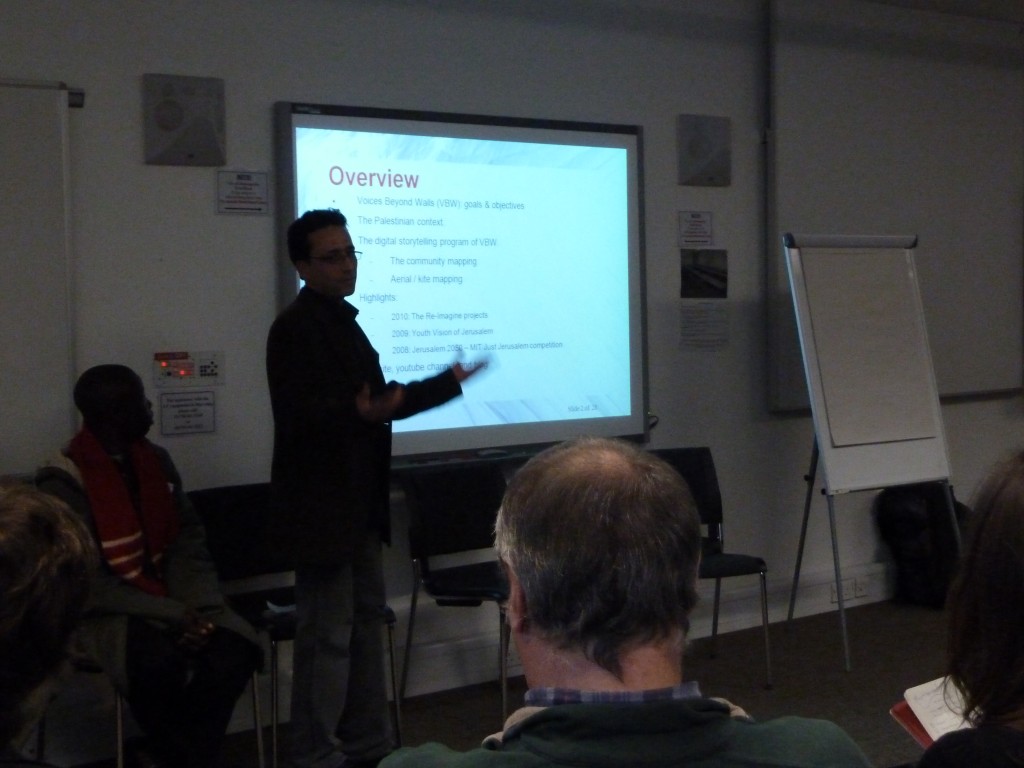by: Erica March 2nd, 2011 comments:
At ICTD London 2010 conference, Kibera mapper and journalist Douglas Namale was inspired to write this post:
ICT4D Should know ICT is NOT Development
The tech and development community appear not to read from the same script the meaning of ‘development’. As budding entrepreneurs cripple with profitability factors, the social school of thoughts, remains skeptical whether ICT is indeed the vehicle to poverty eradication. I agree with Prof. Geof Walsham’s argument that there is need to distinguish between research on ICT in developing countries and research on ICT for development.
Allow me to look at the most mentioned M-PESA as the yard stick to authenticate Prof. Walsham’s belief. One, is it true M-PESA has helped reduce poverty or it has simply lessened the means of money transfer mechanisms? To try and attempt to respond to this question, let us look at it from two perspectives. First, the inventor of the idea, Safaricom, is making close to Ksh. 20 billion profits annually, but the kiosks owners who operate the business on behalf of the company are simply making about ksh. 2 per transaction made though the company deducts ksh. 30 per transaction. On the same note, for every ksh. 20 scratch sold by Safaricom agent/vendor, you only make Ksh. 1.
The above figures leads us to the question, how much does it cost the company to say send one SMS? According to the figures released by Communications Commission of Kenya, for each SMS sent, the cost is about Ksh. 0.30. Until recently, Safaricom was charging an SMS Ksh. 5 and a call was costing Ksh. 7.
The above simple analysis simply explains why this company is making billions in profits and fools people that it’s actually promoting poverty reduction campaigns. Just to borrow a leaf from one of the papers that was presented to ICT4D London yesterday, some communities are actually selling their goats (assets) to get money to buy airtime which already has inflated prices, is it true ICT is promoting poverty reduction?
In my perspective, I can’t indicate any history where ICT alone has fostered development. But history is clear that ICT inventors have used the invention to amass wealth. To mention but a few, Facebook, Microsoft, Dell corporations inventors are today ranked among the world top billionaires, can we be able to locate anything these names have helped in the poverty alleviation agenda?
To conclude, ICTD should be fused in other disciplines if at all it is to achieve its objective use the vehicle to foster development.
by: Erica February 22nd, 2011 comments:
Way back in December, Map Kibera hosted a panel discussion at the ICTD annual conference in London. We held a session on citizen mapping and media, and invited panelists from a variety of video, mapping, and other grassroots digital projects. Of course, the most enthusiastic panelists were Zach Wambua and Douglas Namale, mappers and scholarship recipients from Kibera.

Me and Zach
After an initial denial of Zach’s visa by the British consulate, we were assisted in finally getting both Kenyans admitted. In the end, we think the event was well received we managed to cover a lot of subject matter in a very short time. Douglas and Zach answered most of the audience questions, and had the chance to talk about their community and the issues they faced during the project. They were very well received, as evidenced by the fact that practically the only time we saw them throughout the week was when they shot us exhuberent glances as they talked excitedly with new friends from around the world. Clearly, the scholarship was worth all the trouble Tim Unwin and others put into it.

House was packed in our session at ICTD! Erik Hersman said they wouldn't let him in
We also had Raed Yacoub from Voices Beyond Walls present about their wonderful work in video and mapping with kids in Palestine, and had a lot to share with him about community driven work.

Raed Yacoub presents Voices Beyond Walls
Other panelists we invited couldn’t attend, however, due to the high cost of the conference even just to present at a single panel – they couldn’t afford the fee and neither could we. I was pretty upset about that. This might belie the fact that I’d never attended a proper academic conference before – I’m more experienced with unconferences and the like. In fact, the most interesting part of the conference for me was the contrast (and debates) between academic and practitioner.
The opening session of the conference included a “practitioner panel” with celebs like Erik Hersman from Ushahidi and Ken Banks of Frontline SMS. The message they sent was loud and clear – academics should make a practical impact.
Some sample Tweets during their talk:
“It’s often people who aren’t “qualified” doing experimentation that leads to the best innovation”
“Re: academic – practitioners divide. It’s possible to build methodological bridges. Everyone is a knowledge constructor. Herehere!”
“Ken banks: it’s totally wrong to fly tech implementations around the world – trust local people to work out own implementation”
“We shouldn’t be surprised that tech innovation is coming from Africa says Eric”
“ICT4D research needs to be communicated in language that pracitioners can more readily appreciate”
“I disagree w/those on panel who suggest academics can’t/aren’t doing “real” work in the field, or vice versa”
Browsing the poster sessions and attending many of the paper presentations, I was often struck by the murky in-between area in this particular discipline – many academics were implementing projects, to some extent, while practitioners like ourselves are engaged in research at the same time. And yet, there was a clear difference in purpose and culture. This is still very much an academic field in the making, and many attendees I spoke to were somewhat confused what the outlines were. Were we there to hear companies pitch ideas? Microsoft had funded a huge amount of the featured research. Were we looking for new cool products like a trade fair? There were a number of those on hand, too. Were we discussing thorny issues of international development? Not nearly enough of that for my taste. Were we talking about how technology operates in the world, internet policy, mobile phone usage? This last them came up in many of the papers. But for me, a lot of the discussion left out the primary issues of benefit to the poor and marginalized in favor of interesting graphics and analysis without much follow up.
Although there was a lot of talk in the Tweetosphere about the need to make this more of a Southern conversation, and many attendees were in fact scholarship recipients from the developing world, this perspective seemed sorely lacking from the main events of the conference, even though as Erik and Ken pointed out, a lot of innovation is now coming directly out of the global South etc. There was also a lot of disappointment in the room when Atlanta, GA, USA was announced as host to the next conference because it would mean even more visa troubles getting foreign, poor participants in. This is clearly because it’s academia we’re talking about – and there are still major barriers to most of the world attending – or creating – the kind of elite institution that produce papers accepted for publication. But aren’t we talking about a field that is critically happening NOW in those poorer countries? Do wealthy white people really need to keep talking to each other about it? (Of course – no easy answers here to inclusion problems that plague the development field worldwide).
I was painfully reminded of the frequent divide between benefiting researchers’ thirst for knowledge and benefiting the poor when one researcher presented on mobile phone use in Rwanda. He had acquired amazing amounts of phone data from the dominant phone companies, and mapped out the call patterns showing (predictably, but still kinda cool to see) the rise in calls in a particular region during outbreaks of civil unrest. He had then conducted a study by surveying the people individually in a sample study, because he still didn’t know who was calling who – some privacy did remain. Now, fine, but a comment he made really bothered me: no one EVER refused to answer his questions. His take: “Now I would NEVER answer some of these personal questions on my income, and who was the last person I called and why! But these friendly Rwandans always replied!” The person sitting next to me and I exchanged glances – was this supposed to be a good thing? WHY did every Rwandan reply with personal information to a stranger calling their phone? WHY is it so easy to do extractive research in most developing country settings? Could there be an ethical issue at stake? Has anyone bothered to consider the politics or social issues behind surveying people who are rather at a power disadvantage to you, without offering anything in exchange? And what exactly was the research supposed to lead to – what was its practical purpose – to lead to more publications and better careers for foreigners? Maybe there was more to it, but this wasn’t discussed during the presentation. Perhaps this begs the somewhat existential question, does knowledge for knowledge’s sake make sense when we’re talking about the poor and disadvantaged?
I’ve thought a lot about this during our work in Kibera, a hotbed of academic research. Most people we would meet walking around would ask, are you a student or a researcher (the 2 options)? I would say that optimistically, at least 50% of the time the research does not make it back to the people, much less have an impact on their lives in the long run. Even just enlightening the general public as to research outcomes would be something. It’s much like when documentary filmmakers (like the ones who made Good Fortune) film in Kibera and then produce movies about critical local issues that can’t even be viewed legally online in Kenya.
Having said that – there is clearly a lot of desire among conference participants to bridge the gap between these rather artificially separate disciplines. I hope that this moves forward between now and ICTD 2012.
This post is part of a series exploring the ideas and issues that have emerged in our research project with Institute of Development Studies, supported by DFID. All posts from the Map Kibera team, the researchers from IDS, our trainers and colleagues are collected here. As always, we are eager to discuss this work, so we hope to hear your comments.
by: mikel February 8th, 2011 comments:
“Kibera’s people deserve to know the facts about their lives.” – Robert Neuwirth, Shadow Cities.
The excellent book Shadow Cities narrates a conversation the author had with a Kibera NGO officer who had overseen research into water pricing in Kibera. The ad-hoc system of water vendors and CBOs in Kibera led to water costing 5, 10, 20 times what a resident of nearby wealthy suburbs paid for municipal water. When asked for the reaction of Kibera residents to this news, the officer told him that he couldn’t possibly share this information with residents because there could be riots.
We strongly disagree that Kibera can’t handle truth. Unfortunately this was one of many research projects we heard about that produced reports about Kibera for other audiences, with disinterest to sharing the results even with Kiberans who helped organize the research. It’s unethical.
Map Kibera has received its fair share of research proposals, and have only so far worked with IDS. They shared our values for how research might best work in partnership with ‘practitioners’ (that’s us), and the proper position in the “Research-Practice Balance”. This post is a quick draft at pulling out principles that guide us in research, and hopefully can serve as a brief guide for other research projects that wish to work us, within Kibera, or within any ‘development context’.
Design in Partnership
For us, research is a partnership. We want a core role in the design of the research project, well before they shape of the research is finalized.
If you’re studying development, or designing some kind of technological intervention, you must at least talk to the subject of research well before submitting the proposal (amazingly this doesn’t happen). They will have very specific guidance on what will work, what won’t work, how your research will be better and more beneficial. It’s possible they don’t want to be studied, respect that choice.
With IDS, we met Evangelia last June, and have had a very strong dialogue throughout the entire process.
Contribute concretely to the research subject
Research, especially in Kibera, is often simply extractive. The researcher interviews, surveys, holds group discussions, and analyses the findings, and publishes in a journal. How did the subject benefit? And we’re talking more than simply sharing the results (though that’s important of course). How can a research intervention promote positive change? Yes, this is anathema to usual “objective” research practice. However, our view is that it’s impossible to be disengaged from the subject of development research, and is in fact unethical to not contribute something concrete.
With IDS, all of the interviews and meetings were facilitated by Sammy, leading up to a gathering of everyone to reflect on the results. This was incredibly valuable for everyone to share their perspectives and understand others. We thought of it as Group Therapy. Additionally, we organized an amazing inquiry led learning session with Aptivate, which contributes to creating a guide book for future trainings.
Complement ongoing projects and schedule
Participating in research takes a lot of time and energy. Map Kibera is busy! The perfect time for you might a horrible time for us. Again, let’s work together to design the research so that it doesn’t negatively impact the actually doing stuff.
This isn’t easy of course. Even with IDS, we were going 150% to do both the research and the rest of the day to day. But we worked it out!
Avoid Survey Fatigue
Kibera has survey fatigue. Imagine having a complete stranger coming to your door to ask you detailed questions about your family’s toilet habits. And then someone else doing it. And again. Would you even answer the first time?
Question whether a survey is really required. Can you get the information you need from someone else, or by a different technique. If you must survey, design it in such a way to reduce time required to answer your questions.
Publish data and results open access
Not surprising, I hope, coming from us. Share your research paper openly, in an open access journal or by publishing to your website.
You’ll be able to find all the IDS research results on this blog when finalized.
Further, publish the data, or make it easily available to other researchers. Your data can live its own life, and benefit way beyond what’s possible in your own work. If the data is sensitive, then of course be careful, but remember the default is sharing everything.
What else?
Let us know in the comments!
This post is part of a series exploring the ideas and issues that have emerged in our research project with Institute of Development Studies, supported by DFID. All posts from the Map Kibera team, the researchers from IDS, our trainers and colleagues are collected here. As always, we are eager to discuss this work, so we hope to hear your comments.


